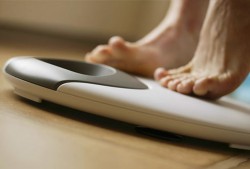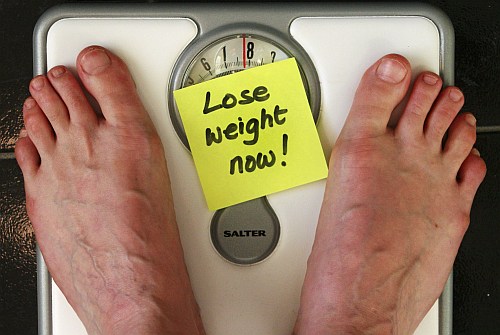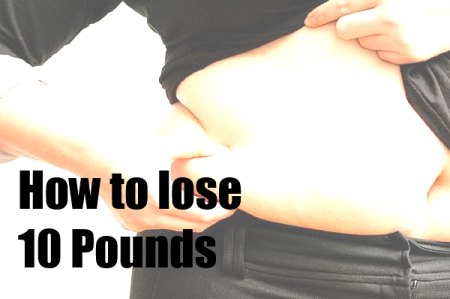How to Lose Weight With a Simple Diet
Dieting doesn't have to be constantly counting carbs and calculating points. If you set up a basic system for yourself and stick to it, the pounds could fall off without you even really feeling like you're trying all that hard. Once you find something that works for you, stick with it and you'll find your goals met before you know it.
Steps
Part 1 Making Simple Diet Changes
-
1
Drink more water. Did you know that if you up how much water you drink, the extra pounds may start falling off on their own? Yep. Drinking two cold glasses of water before meals not only fills you up so you eat less, but can up your metabolism while you eat by about 40%.[1] A fuller stomach and a higher calorie burn means a slimmer you. Does it get much simpler than that?
- Men need to consume more water than women, in general. Men should aim for around 3 1⁄2 liters (0.9 US gal) of water a day, and women 2 1/2. Of course, the bigger you are (man or woman), the more water you need to drink.
-
2
Make fruit your dessert. We've all been there, and this happens to some of us after about practically every meal. We've filled up on our main meal, and now we're eyeing dessert – even if we're not technically that hungry. Before you slice into the chocolate cake, have a piece of fruit. Odds are your sugar craving may get sated.
- Fruit is full of sugar, but it's healthier sugar that won't spike your insulin as much and get turned to fat. Your mind registers the sugar keeping you away from the cake, and your waistline stays that much trimmer. Besides, you're supposed to get 4 servings of fruit a day – and this is a good way to do it.[2]
-
3
Eat five servings of veggies a day. When your diet is full of greens, yellows, and oranges, you know you're getting plenty of fiber and other nutrients, and not a lot of simple carbohydrates and bad fats – that translates to fewer calories and weight lost. Five servings of veggies a day keeps your body running on premium fuel, keeping it full on lower-calorie foods, and may even help prevent disease.[3][4]
- Not only are veggies great for you, but when you're eating them, you're not eating other things, like processed goods (chips, candies, etc.). And the greener the better – green beans, broccoli, kale, spinach, and green peppers are all chock-full of body-healthy and waistline-trimming benefits.
-
4
Switch to whole grains. Some people swear off carbs, and if you want to do so, great. You may experience swift weight loss results. But if that seems a little less than simple, just make sure your carbs are from whole grains. That is, you want brown carbs, not white. Think whole wheat pasta and bread, oatmeal, and quinoa. Avoid white bread, white rice, too many potatoes, and processed baked goods.
- Carbohydrates have the unfortunate tendency of spiking our insulin levels, raising our blood sugar, and making us fat. Whole grains, on the other hand, don't do this nearly as much. They're a good source of fuel and energy without the unnecessary sugar explosion.
-
5
Focus on good fats. There are fats that are good for you, like the unsaturated kind found in olive oil, avocado, and nuts. These leave you sated (fat does a great job of filling us up) and don't spike your sugar levels, keeping your insulin levels steady (and thus avoiding weight gain).[5] It's why the no-carb diets push eating lots of healthy fats; your body actually likes it. So instead of grabbing that low-fat granola, try a handful of nuts instead.
- For a long, long time, fat has gotten a bad rap. The low-fat craze was huge and is still going strong. In reality, low-fat items have been processed with extra sugar to taste good (by and large, anyway), removing their "healthy" label. New research is springing up all over the place that fatty items, like red meats and cheeses, may not be that bad for us.[6]
-
6
Swap out carbs for protein. Protein is the building blocks of the body. Without protein, your body can't repair itself and get through the wear and tear you put on it every day. Carbohydrates are fuel that your body turns to sugar when not used. When your body has no carbs to run on, it turns to fat and then to protein. Cut out the carbs, and your body will start burning your fat stores. And what should you replace carbs with? Protein – the ultimate tummy filler and muscle builder.
- One simple step you can take to eating healthier and losing weight is to cut out your lunchtime sandwiches and replace them with either a hearty salad or chicken or fish. Even just skipping the side of french fries can do your body good, though it's best if you can replace it with nuts or cheeses to keep your body feeling fueled. If losing weight isn't a good enough reason to cut the carbs, know that it can also severely reduce your risk of getting diabetes.[7]
Part 2 Changing How You Eat
-
1
Eat more often. How great would it be if you could lose weight by just eating more often? If you do it right, it could work. Eating more often (smaller meals with snacks in between) keeps us full and away from unhealthy cravings, prevents the binge, helps us feel satisfied, and may even lead to benefits like a reduction in cholesterol.[8] As long as you're eating healthy, of course!
- This is only effective if you're not eating more. Make sure that if you start snacking, your actual meals become a bit smaller. Your general caloric intake should remain the same, if not a bit lower.
-
2
Plan your meals. One of the simplest ways to stay on your dieting regimen is to plan out what you're going to eat through the course of the week. You go to the grocery store and buy everything on your list (for your healthy meals), and there are no surprises because you're sticking to your plan. Tempted to order pizza? Nope – you know you have that salmon in the fridge just waiting to be eaten.
- This helps you stay at home, too. Going out to restaurants is a huge culprit in the obesity epidemic. Portions are huge, calorie counts are huge, there's added sugars and salts, and it's too easy to go overboard without realizing it. When you cook at home, you control every calorie that goes into your dishes.
-
3
Watch your portions. Another easy trick to losing weight doesn't even deal with things you can't eat. In fact, nothing is off limits. All you have to do is watch your portions. A few bites of that chocolate cake is okay, but the whole slice? Nope, you'll pass. You got your fix. Talk about will power!
- To keep on the portion train, aim to eat half of your meal and box the rest up for leftovers. If you get hungry, you can eat it – or you can save it for tomorrow. It's easy on your budget, too.
-
4
Don't eat after a certain time at night. How many times have you been guilty of staying up late, having an extra drink, or snacking the night away without even really thinking about it? Most of us have and it's a regular habit. However, if your dieting plan is to "not eat after 8 pm" that cuts out a lot of potential eating. You eat whatever you want throughout the day, but you cut yourself off. That could be thousands of calories you're missing out on, and some serious weight lost.
- The main struggle with this aspect of dieting is that it gets difficult socially. You want to go out and drink and eat and have a good time, but it's hard with a glass of water in front of you. This comes down to your will power. If you can't do it, try to come up with a compromise. Allow yourself diet soda or tea and veggies after hours, for example. That way you don't feel as excluded when you're out with friends.
Part 3 Trying a Sample Diet
-
1
Stay diligent during the weekdays. Five days a week, put some serious work into your diet. Here are examples for breakfast, lunch, and dinner.
- For breakfast, eat a bowl of oatmeal with low-fat milk with a few raisins or cranberries. You may also opt for a couple of eggs, a piece of fruit, or a piece of whole wheat toast with almond or peanut butter.
- For lunch, include a lean protein like chicken or fish, with plenty of vegetables (or a salad) with beans or sprouts (a great fiber source), and an optional piece of fruit.[9] If you need a drink other than water, go for unsweetened teas or juices.
- For dinner, have a bowl of broth-based soup, a wrap or half a sandwich, brown rice or quinoa, and more fruits and vegetables (fresh, ideally).
- Snacks should be protein and calcium rich, like nuts, cheeses, or yogurt.
-
2
Include exercise in your plan, too. It is recommended to get 150 minutes per week of moderate exercise or 75 minutes per week of vigorous exercise. You can do it all at once or divide it up into 5-minute chunks or anything in between. A mixture of weight-training and cardio is best.[10]
- Sprinkle into your normal routine activities like fast walking or running, swimming, or cycling. Keep in mind that everyday activities, like walking the dog, vigorously cleaning the house, and gardening count, too.
-
3
On weekends, take it easier on yourself. You've put a lot of hard work into the week, and here is your reward. Don't gorge yourself, but do treat yourself to whatever you've been craving. And don't feel guilty about it – there's a lot of science to back up the idea of calorie cycling, or eating more one or two days a week.[11]
- Use Saturday night to be your go-out night, where you can finally hit up that restaurant you've been dying to go to. Getting the craving out will keep you from rampaging through the kitchen and eventually destroying all the progress you've made.
-
4
Or choose a diet that suits you. Sometimes when a diet suits you, it becomes simple. No-carb can be really easy if you love meat and cheese. Low-cal can be easy if you adore fruits and vegetables. Take a look through the articles on wikiHow (or the linked comprehensive guide) and see if something calls out to you that you think you could be successful with.
- What it comes down to is that we're all different. Even twin studies support the idea that we all respond to diets differently (and that certain types of dieting can actually be bad for us).[12] So if one diet doesn't work for you, it may just be because you're body doesn't jive with it, not because you're meant to be bigger. Keep trying, and you'll find something manageable.
-
Top Rated 10 Extra Fat Loss Practices Just For Vegetarians
If this type of requires keeping on a diet to lose weight, simply bec
-
This Man Overcome His Obesity And Became An Ironman
Garth Davis is a physician who changed his life by becoming a self-pr
-
Can Hoodia Really Help You Lose Fat?
Although its benefits regarding loss has been discovered only r
-
Is Weight Reduction Surgery the Right Choice?
In the last fifty years, obesity has skyrocketed. As of 2012, more t
-
Slim Down Successfully And Feel Better About Your Weight!
Anyone who has fought the battle of the bulge knows that it is a
-
No More Excuses: 18 Ways to Stick to Your Goals
Stick to Your Workout Schedule You get to the gym and realize you dont
- DON'T MISS
- Weight Loss Tip #40 – ‘Soup’erb way to lose weight!
- Find Out How To Lose Weight Without Fuss
- How to Lose Weight and Stay Healthy With a Disability
- Throw Away Those Pounds While Having Fun!
- Use These Great Weight Loss Tips To Help You Succeed
- Is Your Doctor Judging You?
- Burn Fat While You Sleep is Real! Here’s How…
- Just 2 Tbsp. Of THIS Mixture To Your Morning Coffee Will Burn A TON Of Calories
- Sweet and Dangerous
- Weight Loss Tips- How To Lose Weight And Maintain A Healthy Lifestyle?




